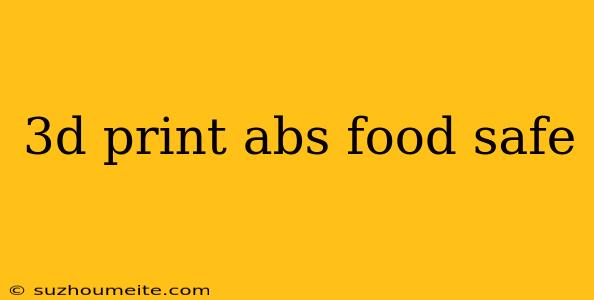3D Print ABS: Is it Food Safe?
Introduction
With the rise of 3D printing technology, it's become increasingly popular to create custom parts and products for various industries, including food processing and handling. One of the most commonly used 3D printing materials is ABS (Acrylonitrile Butadiene Styrene). However, when it comes to food safety, the question arises: is 3D print ABS food safe?
What is ABS?
ABS is a type of thermoplastic that is widely used in 3D printing due to its durability, impact resistance, and affordability. It's a popular choice for creating functional parts, prototypes, and models. However, its chemical composition raises concerns about its safety for use with food.
Food Safety Concerns
ABS is a petroleum-based material that contains chemicals like styrene, which has been linked to potential health risks. When ABS is used in food processing or handling, there's a risk of chemical leaching into food products. This could contaminate food and pose health risks to consumers.
Additionally, ABS materials can be porous, which can harbor bacteria and other microorganisms. If not properly cleaned and sanitized, these microorganisms can multiply and contaminate food products.
Is 3D Print ABS Food Safe?
The answer is a resounding "no." 3D print ABS is not considered food safe. The FDA (Food and Drug Administration) has specific guidelines for materials used in food processing and handling, and ABS does not meet these standards.
Alternatives to ABS
If you need to create parts or products for food processing or handling, consider using food-safe materials like:
- PLA (Polylactic Acid): A bioplastic that's derived from renewable resources and is biodegradable. PLA is a popular choice for food packaging and handling applications.
- PETG (Polyethylene Terephthalate Glycol): A variation of PET (Polyethylene Terephthalate) that's commonly used in water bottles. PETG is a food-safe material that's suitable for food processing and handling.
- Food-grade silicone: A flexible and durable material that's often used in food processing and handling applications.
Conclusion
While ABS is a popular 3D printing material, it's not suitable for food processing and handling applications due to potential chemical leaching and bacterial contamination risks. Instead, opt for food-safe materials like PLA, PETG, or food-grade silicone to ensure the safety of consumers.
Remember
When working with food processing and handling applications, it's crucial to prioritize food safety and choose materials that meet FDA guidelines. Always research and select materials that are safe for use with food to avoid potential health risks.
